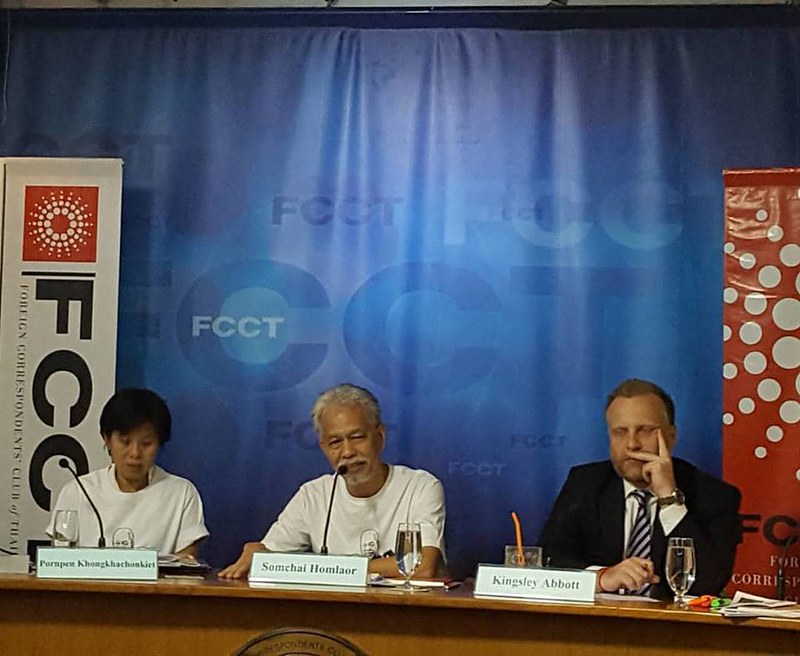While Thailand is making strides in anti-torture legislation, experts argue the government’s continued prosecution of human rights defenders makes this formal progress hollow.
At a public panel convened at the Foreign Correspondents’ Club of Thailand on Wednesday, 24 August 2016, representatives from local and international organisations called upon the Thai government to drop charges levelled against three human rights defenders investigating torture in Deep Southern Thailand.
In May 2016, the Internal Security Operations Command (ISOC) accused three human rights defenders of defamation under the Criminal Code and of spreading false information under the Computer Crimes Act in relation to their contributions to a report detailing 54 cases of torture by the state security forces in the Deep South.
The accused are Pornpen Khongkachonkiet, Chair of Amnesty International Thailand and Director of the Cross Cultural Foundation (CrCF), a civil society group promoting cultural diversity and human rights; Somchai Homlaor, former president and current advisor to the CrCF; and Anchana Heemmina, president of Duayjai, a local human rights advocacy group in the Deep South.
Kingsley Abbot, a senior international legal adviser to the International Commission of Jurists, emphasised on the evening “the contradiction between the actions Thailand has claimed it has taken to address torture, and the prosecution of these human rights defenders”.
On one hand, the lawyer commended Thailand for the considerable formal progress it has achieved in signing onto international anti-torture frameworks. Thailand has ratified the International Covenant on Civil and Political Rights and the Convention Against Torture, making these legally binding in the country. It has also signed the Convention for the Protection of All Persons from Enforced Disappearance, which commits Thailand to not taking any action inconsistent with the treaty.
Kingsley emphasised the seriousness of these international commitments, stating, “These international obligations are not abstract notions or suggestions that are coming in from a long way away. They are international legal obligations that Thailand itself has agreed to be bound by. They have voluntarily ratified these treaties and in so doing have agreed to be bound by their terms”.
Other anti-torture initiatives of the government include the production of a draft law on the prevention and suppression of torture, the development of a human rights training curriculum for military personnel and co-operation with the UN High Commissioner for Human Rights to train medical personnel on investigating torture.
But Kingsley pointed out that the prosecution of three human rights defenders themselves committed to eradicating torture demonstrates Thailand continues to lack in actual substantive improvements to human rights. One of Thailand’s key commitments under international law is to protect human rights defenders, particularly by not enacting reprisals against them.
‘Having adopted all these laws, and made all these commitments on the international stage, and having taken all these positive steps to eradicate torture in Thailand, how can it be that Pornpen, Somchai and Anchana are now facing criminal charges for their work to address the very issue that Thailand claims it takes seriously?... [The case’s] existence calls into question Thailand’s sincerity when it claims it places great importance on the prohibition of torture and the protection of human rights defenders.’
The report in question, titled ‘Torture in Thailand’s Deep South’, describes in graphic detail through the testimonies of torture victims both psychological torture methods (such as mock executions, prolonged interrogations, sleep deprivation) and physical torture methods (such as beatings, oxygen deprivation, water boarding), as well as the long-term health and trauma risks inflicted by this torture.
Rather than investigating these allegations, ISOC spokespersons accused the report’s testimonies of being falsified and of being an attempt to discredit ISOC. At the FCCT panel, both Pornpen and Somchai condemned the Thai state’s essentially non-existent record on prosecuting torture. While cases compensation to victims are increasing, they remain in the minority and do nothing to end impunity for torture perpetrators.
Somchai further demonstrated the Thai government’s contradictory approach to the issue of torture, by revealing that the previous day he had received a call from ISOC inviting him to be a member of a committee of civil society representatives mandated with investigating the report’s allegations. The invitation was the first contact ISOC had made with Somchai since 16 May.
Somchai interpreted ISOC’s ironic invitation as a sign of the organisational disunity of government agencies working in the Deep South, as well as a possible reaction to escalating unrest in the region.
Yet Kingsley argued it is ultimately in the Thai state’s interests to drop the charges against Somchai, Pornpen and Anchana since the government has attempted in recent years to promote a positive international image for itself through anti-torture laws and other initiatives.
He cited the considerable international criticism Thailand’s junta has received regarding its torture record, including a scathing formal review in 2014 by the UN Committee on Torture.
‘Sadly, [the case] works to undo much of Thailand’s important work and the work of many dedicated officials working inside the Thai government to address torture. After this case, will people who legitimately allege or believe they have bene tortured feel safe raising their allegations with NGOs knowing those same NGOs may end up being prosecuted in criminal courts?’
Kingsley concluded by stressing it is not too late for the government to begin salvaging its deteriorating international image by dropping the charges against the three human rights defenders and by initiating constructive relations with the NGOs they represent instead.

(From left to right) Pornpen Khongkachonkiet, Somchai Homlaor, and Kingsley Abbott, speakers at the FCCT's panel discussion on torture in Thailand (Photo from Jasmin Lutzi's facebook account)

